


FALL 2022
4 Message from the President – ACHE of North Texas 8 Message from the Regent – ACHE Texas North 10 Message from the Regent – ACHE Regent At Large, District 4 14 Member Spotlights 24 Event Encore 38 National News 40 Membership Annoucements 42 Calendar of Events FEATURES Telepsychiatry Licensure and My Personal Vignette 18
Editors
Contributing Writers
Vanessa Lee
Amanda Brummitt, FACHE
Kean Villarta
Michael Belkin, FACHE
Amanda Brummitt, FACHE
Vanessa Lee
Audrianne Schneider, FACHE
Jim Allard, DNP, RN, NEA-BC, FACHE
VP of Nursing & CNO Medical City Children’s/Medical City Women’s Hospitals
Patrick Brown, VP & COO Methodist Charlton Medical Center
Jaquetta Clemons-Davis, Executive, Financial Planning & Analysis Adventist Health
Fraser Hay, FACHE President
Texas Health Harris Methodist Hospital HurstEuless-Bedford
Creative Direction
Advertising/ Subscriptions
Questions and Comments:
Caleb Wills, calebsemibold.com
info@achentx.org
ACHE of North Texas Editorial Office, c/o Executive Connection 300 Decker Drive, Suite 300 | Irving, TX 75062 p: 972.413.8144 e: info@achentx.org w: achentx.org

2022 Chapter Officers
President Dustin Anthamatten MBA, MA, CPA, FACHE
VP Operations – Corporate Methodist Health System
Immediate Past President Amanda Thrash, FACHE
VP of Professional & Support Services Texas Health Plano
Carolyn Hunter
Chief Operating Officer Medical City Las Colinas
Valerie Johnston, PhD, FACHE Associate Professor Texas Christian University
Joseph Clayton Lawrence, FACHE Group Vice President Sound Physicians
Ajith Pai, PharmD, FACHE
President
Texas Health Harris Methodist Hospital Cleburne
Trinette K. Pierre, DHA, RN, NEA-BC, FACHE Executive Consultant TRImani Consulting, LLC
Kris Sanders, FACHE
President-Elect
Felixia Colón, FACHE Sr. Vice President & Group Operations Officer SCP Health
Treasurer Aaron Bujnowski, FACHE Director (Partner) & IDN Lead The Chartis Group
Secretary Benton Sprayberry, FACHE
Senior Director of Operations Steward Health Care
SVP/Northern Market Growth & Development Children’s Health System of Texas
Keith Thurgood , PhD Professor University of Texas at Dallas
Toya White, FACHE
Chief Operating Officer & Chief Nursing Officer Texas Health Resources
Mary Wylie, FACHE
Vice President of Operations
Baylor Scott & White Medical Center Plano
The ACHE of North Texas e-magazine,
trends
info@northtexas.
our members shared in past ACHE of North Texas magazines,
Microsoft
conference submissions, and workshop participations,
The Executive Connection, is published triannually and includes information on the latest regulatory and legislative developments, as well as the quality improvement and leadership
that are shaping and influencing the healthcare industry. Readers get indepth reporting on the issues and challenges facing hospital and health system leaders today. We make it our job to tell you about the great things the organization and Chapter are doing every day to ensure the health of our community. If you have any news and updates that you want to share with other members, please e-mail your items to
ache.org.
Word or compatible format is preferable. If you have a graphic or picture that you'd like to include, please send it as a separate file. The following are the types of information that
Advocacy Issues, Legislative Issues, Educational Opportunities, Awards / Achievements, Promotions (Members On the Move), Committee Updates, journal submissions,
sharing mentoring experiences, etc.
Message from the President – ACHE of North Texas
Well, that was a hot summer, I hope all of you were able to stay cool and attend one of our in-person ACHENTX events we mentioned in our prior issue! With the temperatures cooling and the holiday season approaching, the board is reflecting on what our organization has accomplished this year and we have much to be thankful for. So far this year, ACHENTX has held more than 45 events with more to come and momentum is building for 2023 to be our strongest year yet!
That being said, I would like to use this as an opportunity for a shout out to the amazing work our committees and members have accomplished. First, by the end of the year, our Education Committee will have offered 24 Face-to-Face credited hoursBy partnering with other chapters, we have maximized our opportunity to serve our mission, the professional development needs of our healthcare professionals in the Dallas/Fort Worth metroplex and 19 surrounding counties. Even with a
offerings. Our Mentorship program continues to be a success with our organization mentoring approximately 60 leaders and the closing ceremony for this year’s class is scheduled for November 3rd, 2022. Our Sponsorship Committee has driven growth this year, achieving their goal for more diverse sponsors and may have set a record for funds collected to support ACHENTX’s mission and growth. Last, but certainly not least, our Student Council held the Channels for Lifelong Learning for Healthcare Executives on September 29th at TCU and is already working on their DFW Healthcare Student Summit for early next year.
portion of the year being impacted by the pandemic, we have had many events supported by our Membership & Networking Committee: four Breakfast with the CEO/ Presidents, two Cocktails with the Chiefs, four After Hours events – including three Rangers games and an Axe Throwing event, two community events supporting local charities, and two topic-specific virtual educational
I would also like to update you on our strategic goals this year. In regards to our ACHENTX Foundation, we received non-profit status as a 501c(3); this will allow us to support donation opportunities for individuals to support the education portion of our mission and we will begin operationalizing this entity later this year. Major kudos to Aaron Bujnowksi, our acting Treasurer, for
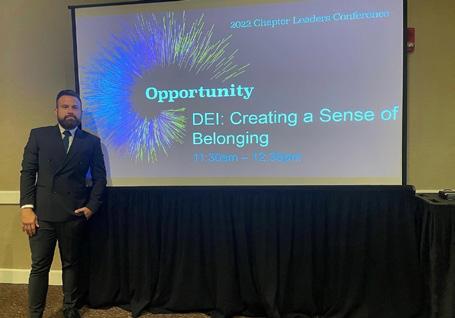
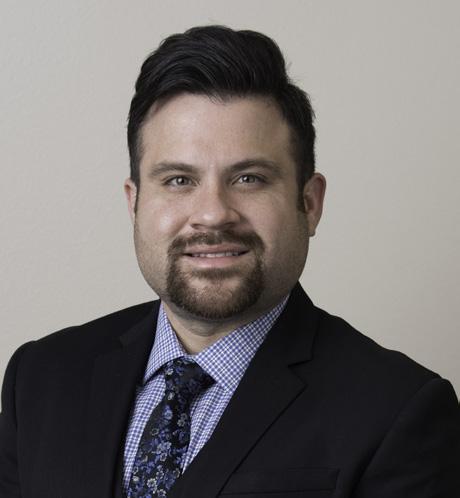
4 A Publication of the American College of Healthcare Executives of North Texas Chapter | FALL 2022
bringing this innovative idea to our team and executing its creation. Also, in our inaugural Executive Connection issue this year, we discussed our goal to become the best practice chapter for diversity, equity, and inclusion (DEI) in the United States. Through the leadership of our board, committee leadership, and our members, I am honored to declare that we achieved this. The week prior to penning this message, ACHE National asked us, ACHENTX, to present our DEI best practices at the ACHE Chapters Leaders Conference 2022 with the hope that our model could be shared across all chapters. I was so proud of the recognition our chapter’s leadership and culture received, but, more importantly, it was rewarding to share a framework that could be replicated across the United States to, “Create a Sense of Belonging,” in other chapters and organizations across the nation.
At the risk of repeating myself, it is a privilege to be part of this group and it warms my heart to witness the outcomes of the intentionally inclusive environment our board, committee leadership, and members have created for each other and are taking back to
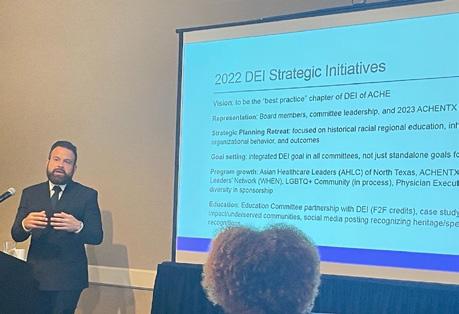


our organizations. I am looking forward to seeing all of you at the General Membership Convocation on November 10th and looking forward to what we will accomplish in the closing months of 2022!
Dustin Anthamatten, MBA, MA, CPA, FACHE VP Operations – Corporate Methodist Health System
















& Committee Leadership Representation


ACHENTX Chapter
GENDER/GENDER
Board
ACHE NORTH TEXAS 5 ACHE Description Leadership1 (N = 41) Members2 (N = 1,689) Members2 (N = 47,475) RACE/ETHNICITY White (non-Latino) 31.7% 42.5% 48.5% Black (non-Latino) 29.3% 9.3% 6.3% Hispanic/Latino 4.9% 4.5% 3.4% Asian or Pacific Islander 17.1% 5.1% 4.2% American Indian, Eskimo, Aleut 2.4% 0.5% 0.3% No Response 14.6% 38.0% 37.3%
IDENTIFICATION3 Female 48.8% 39.9% 38.3% Male 36.6% 46.1% 48.4% Unknown 14.6% 14.1% 13.3% Footnotes: 1 - internal survey of ACHENTX's board and committee leadership 2 - ACHE's Chapter Demographic Report (as of November 2021) 3 - ACHENTX used pronouns (ex. she/her, he/him) for gender identification
A slide from Dustin’s presentation in Chicago at the ACHE Chapter Leaders Conference 2022, showcasing the diversity of our ACHENTX leadership as compared to our chapter membership and the overall ACHE national membership.
Message from the Regent – ACHE Texas North
Esteemed Colleagues and Friends,
I pray this correspondence finds you well. I’m hopeful that you are in a better space now than you were at this time in 2021 and that positive progression continues in your realm.
Leaders, we are blessed with a large network of phenomenal healthcare professionals that we are privileged to interact with each day. At each meeting, on each shift, and in each healthcare realm, we encounter those who are willingly giving of themselves for others’ benefit. They work diligently and vigilantly to ensure our communities remain healthy. We know and the community now knows that this is no miniscule assignment. Our healthcare teams are heroes. As a person who has been blessed to work alongside some of the most talented and gifted healthcare professionals in the business, I have given thanks for those who are out there caring for those who enter our healthcare facilities to receive the care that we willingly and selflessly render to those in need. The work is tiring, difficult, and can be mentally exhausting, but this is what we signed up for, right?
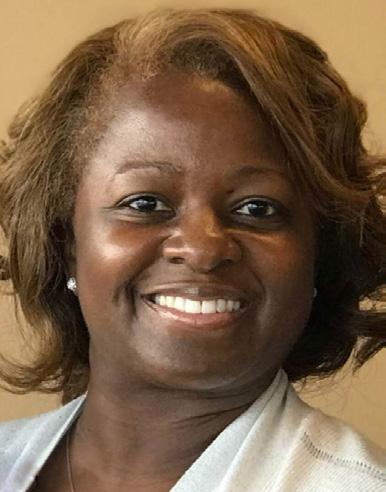
If you are like me, you have embraced your team and supported them in all aspects of the care they give. The mission of healthcare is to care for those in need and to ensure we leave our clients in better and healthier condition than when we first crossed paths. Although these words may be rearranged and plugged and played in various strategic statements and think tank-born mantras, this is the ultimate mission of healthcare as a profession. If you are like me, you have deemed your department, clinic, organization, or healthcare business successful if these patient-centric duties were met. Is that enough? I feel there is more that is expected of us.
Within the past year, I experienced something that went beyond the mission statement above and hit closer to home for me. This issue did not focus on patient care, but on the amazing healthcare professionals I have worked alongside. While I have experienced more than one situation where someone I knew faced difficult situations, I will share one incident that made me take a second glance at myself. A healthcare professional came to me during shift change. The previous night was riddled with issues that needed to be addressed at shift change. The next morning and as I was entering my office after meeting with countless visitors and patients, this individual (who
6 A Publication of the American College of Healthcare Executives of North Texas Chapter | FALL 2022
was always smiling) asked me if I had time to chat with her for a moment. I was rushing to get to a leadership meeting, but promised to chat with her on another day. This was an abnormal response from me and she seemed shocked to hear those words being voiced. I felt uneasy voicing them as well, but, my meeting. The young lady stated, “Sure, I understand,” and we passed one another in the hall as I rushed to get to my meeting. I felt a strong urge to go back into the hall to chat with her, but the meeting was starting. I attempted to ignore the uneasy feeling and rushed to the meeting. I comforted myself by stating I would interact with this individual the next time I saw her. No big deal, although I continued to feel uneasy.
Less than a week later, I received an after-hours call from another colleague asking if I happened to know the young lady I was interacting with while rushing to my meeting. I was then asked if I had emergency contact information for her. Unfortunately, I have been tasked with making similar calls before; therefore, I knew something horrible was coming. When I asked what happened, I was told that this amazing young woman was on her way to work her shift, but never made it. Simultaneously, I was getting texts from other healthcare professionals regarding this individual’s whereabouts since she was always early for work. I soon learned that this individual was in an accident (which unfortunately resulted in her untimely death a few days later). I immediately thought back to our last interaction and I immediately felt a deep pang of sorrow and regret overcome my spirit. It was the same uneasy and sorrowful feeling I experienced a week earlier while rushing to my meeting after our brief encounter, yet much worse. I kept telling myself that I should have taken five minutes to chat with her. If only I had known.
As I repeatedly reflected on this horrible incident over the past year, I am often reminded that there is a lesson even in the hurt. It is a harsh lesson, but timely. Here it is: If this was a patient or visitor, would I have dismissed that individual to fall in line with the busyness of healthcare? Would I have taken a moment to listen to the concerns presented by a visitor at my office door or would it have been deemed appropriate to rush past a client to get to a meeting? I believe I would have taken the time to listen to a client because they come first – meeting or not, right? I have been late to many meetings because I was in a client’s presence. This was seen as noble, respectful, and dutiful. Why did I not give the same level of importance and respect to the amazing person who was giving of herself to care for our
clients? In this isolated incident where I delayed spending time with someone who was the heart and soul of my organization, I put less importance on the organism and more importance on maintaining the busyness of the organization. In this brief moment of oversight that ultimately ended in long-term regret, I failed to remember that the person standing in front of me was the one who carried out our mission each day. She was infinitely more important than the meeting, but busyness took precedence. This never happened again. The question I now ask before moving forward is “Would this be my response if this request was coming from a visitor, patient or client, or board member? Would I take the time?”
Although this is a very difficult incident to relive and difficult for many to read, I pray my transparency in this experience can create a moment of reflection for all. I am sure I am not the only person who opted to decline meeting or chatting with an individual based on perceived “tiered importance.” While there are times when we must not leave others waiting and we must carry out certain duties in a timely manner, can we honestly say we have correctly prioritized the importance of all of our interactions? I cannot.
I hope that this will remind us to treat our amazingly talented team members and healthcare professionals with the same respect and priority that we give our healthcare clients. As is our mission in healthcare, we often focus most of what we do around our clients. I can say that this was an incident where I lost sight of those who are most important: those caring for our clients. Without them, mission statements mean nothing. While many organizations spend millions on employee engagement initiatives, processes, consultants, etc., there is a very simple way to show our team members that we care about not only what they do to keep business going, but we care about them as human beings as well. We can take the time. Will it be easy or always convenient to do this? No. Are our team members worth it? Yes. Please resolve to do what I have learned at the hand of this difficult lesson: take the time. Be blessed.
Dr. Trinette K. Pierre, DHA, BSN, RN, CCC, CEC, CHLC, FACHE, NEA-BC Regent – Texas Northern
Message from the Regent – ACHE Regent At Large, District 4
As Regent At Large for District 4, I am pleased to share a Fall 2022 update. I am returning from a phenomenal ACHE Chapter Leaders Conference with representatives from our ACHENTX Board leadership - Dustin Anthamatten (President), Felixia Colon (President-Elect), and John Whittemore (Executive Director). There was time to provide input as regents to ACHE on how ACHE can support our members as we move into the future with our chapter’s strategic plan. It truly was an innovative and creative session. Additionally, we learned a method of Lean, where one builds a plan around the value and services provided to the customer or our members. It was a unique way to consider our strategic planning as we consider the chapter approach to 2023 and beyond.
There was wonderful dialogue on where chapters are making positive strides with diversity, equity and inclusion efforts, and Dustin had the opportunity to showcase the exceptional work being accomplished both past and future by ACHENTX. I left energized with best practices from other chapters which we can consider for potential implementation in our chapter. We must continue to partner together to educate, provide content, and challenge one another to strive for equity in all aspects of the work we do, which will lead to inclusion and ultimately belonging.
In my role as Regent At Large for District 4, I support Regents, along with the Diversity, Equity and Inclusion chapter leadership in 10 states around the agenda and strategic plan of ACHE National. If there is anything I can do to support you, as members, I am open to having discussions to provide content or direction with your efforts. As we move into the holiday season of reflection, celebration, and giving, think about what you can do as a leader to celebrate your success and consider how you elevate open conversation and discussion around diversity, equity and inclusion. “We are better together.”
Jim Allard District 4 Regent At Large LGBTQ Healthcare Leaders Community Committee – Chair

8 A Publication of the American College of Healthcare Executives of North Texas Chapter | FALL 2022

A Publication of the American College of Healthcare Executives of North Texas Chapter | FALL 2022 9 SAVE THE DATE ACHENTX’s Annual General Membership Convocation November 10, 2022 / Brookhaven Country Club SAVE THE DATE




10 A Publication of the American College of Healthcare Executives of North Texas Chapter | FALL 2022 christushealth.org A Catholic health system in the United States, Mexico, Chile, and Colombia with more than 60 hospitals, 600 services and facilities, 45,000 associates and 15,000 physicians. Our Mission To extend the healing ministry of Jesus Christ.
us online ACHENTX.org



Visit
Member Spotlight
Shonna Bracco, DNP, RN, NEA-BC, CSSGB
What are you doing now?
I am the Chief Nursing Officer (CNO) at Texas Health Arlington Memorial hospital a 360-bed community hospital. I have oversight of all inpatient and outpatient nursing departments and am the interim leader for Pharmacy, Inpatient and Outpatient Rehabilitation, Respiratory Therapy, and the Arlington Sports Medicine Clinics. We are a Magnet designated facility and I am honored to serve as their CNO.

In your opinion, what is the most important issue facing healthcare today?
The most important issue facing healthcare today is the retention and health of healthcare workers. With a shortage of healthcare workers available as well as the COVID pandemic causing many to retire early, leave healthcare,and travel, it has left a burden on those who remain. Healthcare is very rewarding; however, it can also be challenging and many times exhausting. Workplace violence incidence against healthcare workers has only increased throughout the pandemic. As healthcare leaders, our challenge is to create work environments that are healthy, safe, and rewarding for our team members to practice in.
How long have you been a member of ACHE?
I have been a member of ACHE since 2017.
Why is being a member important to you? Has ACHE membership been a benefit to you in your career?
Being a member is important to me because it expands my network. It allows me the opportunity to collaborate with other executive leaders who may be experiencing similar challenges and allows the opportunity to share best practices and learn from each other. It expands my network outside of nursing to include all disciplines and areas of healthcare.
What advice would you give early careerists or those considering membership?
I would tell early careerists to take risks and be innovative. Be open to new ways of doing things. Always make sure all stakeholders are at the table when decisions are made. I would encourage them to listen, especially to the people doing the work. I would encourage them to join ACHE and to get involved at all levels, which allows you to be a more effective change agent.
Tell us one thing that people don’t know about you
I live on a small hobby farm and have an intense love of animals. I have lots of animals including a sulcata tortoise, 2 miniature donkeys, a pot belly pig, and we raise registered Brahman cattle called Sardo Negro. I am a sucker for animals who need a home and will often share my home with them.
12 A Publication of the American College of Healthcare Executives of North Texas Chapter | FALL 2022
Member Spotlight
Kris Sanders, FACHE
What are you doing now?
I serve as the Senior Vice President, Northern Market Growth and Development at Children’s Health.
I am responsible for developing, communicating, executing and sustaining strategic priorities that expand clinical programs and community partnerships in the D-FW Northern Market region.

In your opinion, what is the most important issue facing health care today?
There are many important issues that we are facing. One that immediately comes to my mind is social determinants of health. Until we acknowledge as an industry that this is an issue facing the communities we serve, we will not be set up for success for generations to come. While the last few years have brought about change in this area, we still have quite a way to go to see the true impact. The work to provide equitable health in all our communities must stay a priority.
How long have you been a member of ACHE?
I have been a member of ACHE since 2010 and a fellow since 2017.
Why is being a member important to you? Has ACHE membership been a benefit to you in your career?
I joined ACHE as an early careerist where I learned valuable skills that spanned across various levels of healthcare delivery through the educational offerings that I would not have learned otherwise. ACHE is important because it provides me with an avenue to connect with like-minded health care leaders that challenge me to think outside of the box and engage in meaningful exchanges.
What advice would you give early careerists or those considering membership?
Don’t delay – the connections and network you gain through ACHE membership cannot be found any place else! The ability to engage with other health care executives and share thoughtful ideas is imperative to your success as a leader. This network is what you need.
Tell us one thing that people don’t know about you.
My mom was laid off from her job after 25 years and she neglected her preventive care for two years because she was unaware of what was available to her and didn’t truly see the importance of it. Ultimately, she was diagnosed with breast cancer after a visit to the emergency room for back pain. By that time, she was stage 4. While my mom may have lost her battle to breast cancer three years later, she is the true reason why I will continue the fight to inform our communities of their resources, the importance of preventive care and access to health care because had my mom been diagnosed during that two-year time frame her treatment options may have been different and she may have still been with me today.
Member Spotlight
Christi Nguyen, DNP, RN, FACHE, NEA-BC

What are you doing now?
I am the Associate Chief Nursing Officer of Nurse Excellence at UT Southwestern Medical Center.
In your opinion, what is the most important issue facing health care today?
One of the most important issues facing healthcare today is the workforce and staff resiliency. The pandemic changed a lot of things in health care and nursing. There are a multitude of factors affecting the workforce - the type of patients we’re caring for has changed, the increase in workplace violence from patients, and people leaving the profession or retiring early.
How long have you been a member of ACHE?
I have been a member of ACHE since 2003 as a MHA student
Why is being a member important to you? Has ACHE membership been a benefit to you in your career?
Being an ACHE member has helped me grow in my career from the networking, mentoring, and becoming certified as a Fellow. I still remember the coaching and mentoring I received from Fellows early in my career. It was a Fellow who encouraged me to pursue my FACHE and pushed me to grow as a leader. The North Texas Chapter has also been an outstanding chapter because of all the services it provides members such as Faceto-Face Category 1 educational sessions, mentoring programs and networking activities.
What advice would you give early careerists or those considering membership?
Definitely join and get involved with ACHE. We are blessed to have a very active chapter in our area. Serve on a committee. Sign up for the Mentoring Program. Once you’ve been a mentee, pay it forward and mentor someone else.
Tell us one thing that people don’t know about you.
I’m a first-generation college graduate; also, the only one in my family who has a double master’s and doctorate degree. As a nursing student, it was something I never dreamed of doing, especially getting my doctorate. It was because of my amazing leaders and mentors that I have had the pleasure of working with in nursing and ACHE that I am where I am today.
14 A Publication of the American College of Healthcare Executives of North Texas Chapter | FALL 2022




A Publication of the American College of Healthcare Executives of North Texas Chapter | FALL 2022 15
Telepsychiatry
Licensure and My Personal Vignette
By Vanessa Lee
16 A Publication of the American College of Healthcare Executives of North Texas Chapter | FALL 2022
At 2:28 am on a Wednesday in the midst of a summer heat wave, I welcomed my second child into the world.
The hospital experience was completely unlike when I delivered my first child four years prior - different city, different hospital system, different times. When the dust settled in the delivery room, there was no family to celebrate with except for my husband. In fact, no one on the OB floor had but one support person with them. It was strange to not be able to introduce our families to their youngest member. COVID had changed all that. But, my story is not unique in “unprecedented” times; so many families were learning to experience loss, joy, and everything in between remotely and virtually.
Fast forward five weeks and life was anything but “normal,” or what I had hoped normal to look like. Lack of sleep, anxiety about the pandemic outside our doors, and a million other stressors pushed my mental health onto the back burner. I started worrying about everything all the time. Would the visitor to our home have COVID? Had they been exposed? What if they got the baby sick? What if they got me sick? What if I died? Who would take care of my family? The baby was just so little, how would my husband be able to manage it all? I worried so much I stopped being able to fall back to
sleep after feeding the baby at night. Between the sleep deprivation and the sense of impending doom, I began to forget things and my husband would find me staring at nothing while holding the sleeping baby in my arms. I would start crying unexpectedly and uncontrollably. By that point, I couldn’t remember if I had eaten or the last time I showered. I struggled to find the right words or even make grocery lists.
I felt like my mind and my personality was slowly slipping away - I even looked up the symptoms of early on-set dementia. I have been an overachiever all my life and being able to rely on my mind to make music to pro formas is how I defined my self-worth. At my check up with my OB, I remember distinctly the ridiculousness of the postpartum depression screening questions:
• I have looked forward with enjoyment to things. What things are they talking about? Going shopping while avoiding every breathing person while wearing the most stylish PPE and spraying down everything with sanitizing spray? Or going out to eat? –wait, nevermind, COVID. Maybe a vacation? Nope, COVID. What is it exactly that I am looking forward to?
• I have been anxious or worried for no good reason. … Are you kidding? There are literally hundreds of thousands of people dying from a highly virulent virus with little hope of it slowing down anytime soon. I felt like all my worries were for a “good reason”.
A Publication of the American College of Healthcare Executives of North Texas Chapter | FALL 2022 17
Perhaps in the “before times” these questions would have seemed legitimate, but in the midst of COVID, I just felt like the standard screening tool was mocking me. Anyway, it was clear that I was suffering from postpartum depression and anxiety. A script was written, filled, and picked up that very afternoon. But, by this time, I was expected to be back in the office the next week and I was still a mess. I couldn’t guarantee that I wouldn’t burst into tears in my cubicle. I’m sure that it would just attract attention which would exacerbate the anxiety and make a wholly unprofessional scene.
Thankfully, my leader was incredibly understanding and we were able to make arrangements for me to work from home while I sorted myself out with medication and counseling. But, because mental health is not as simple as a prescription and a pat on the back, I continued to struggle. Exacerbated by the stress of our now four-month old being hospitalized for RSV over Christmas and my husband being suddenly laid off from work, I slipped farther and farther from myself. The medications my OB tried weren’t working and I needed more care than her expertise allowed.
Well, apparently everyone and their moms were trying to find mental health/behavioral health care at the same time I was. That is no hyperbole, according to Mental Health America, the rate of moderate to severe symptoms in screenings for anxiety and depression peaked at 80%! Every psychiatrist’s office I called within 25 miles either didn’t call me back, wasn’t open for new patients, or didn’t take insurance. I called my employer’s EAP line in hopes of being pointed in the right direction but that was a bust. I would have normally reached out to my PCP but my doctor’s office had closed permanently while I was on maternity leave.
Like all of you, I work in healthcare and I dare I say that I am uniquely aware of the shortages of professionals in the behavioral health realm due to my previous work in Iowa and Illinois.
Even with new psychiatrists entering the field, more than 60% of psychiatrists are currently aged 55 or older and are rapidly approaching retirement — the fourth oldest group among medical specialties. This will lead to a potential shortfall of 6,000 to 15,000 psychiatrists by 2025. The shortage will further squeeze practicing psychiatrists, who are currently spread thin with untenable caseloads. Fifteenminute visits once every three months have become standard in many settings, which is barely enough time to properly complete a progress note, let alone provide high-quality medical care.
-Mike Belkin, JD
Recognizing that there was no obvious way I was going to get help in a traditional way, I did what any Millennial does and started googling for telepsychiatry services. “Telepsychiatry has been found especially effective with respect to the treatment of PTSD, depression, and ADHD. Furthermore, according to (Di Carlo et al., 2021), for patients telepsychiatry improves access to care, reduces, appointments’ waiting time and decreases travel time and costs” (Belkin, 2022).
I feel like the effectiveness of telepsychiatry has always been obvious, but I remember how back in the “before times” there were so many barriers for implementing telehealth in general. Sure, there were providers who

were resistant to change, all sorts of issues with insurances and reimbursement, and other infrastructure issues. However, much of the trouble associated with widespread access to care in Texas was due to “entrenchment of state medical boards” as exemplified in the 2016 case of Teladoc, Inc v Texas Medical Board (Belkin, 2022).
A lot has happened since then. In 2017 Texas eliminated a state policy that limited telehealth utilization in the state. Telehealth in Texas was being talked about in boardrooms and pilot programs started showing favorable metrics; health systems were being courted by vendors offering on demand urgent care, after hours coverage, and high-tech devices. Then, COVID happened. And, as we all know, everything was in short supply and telehealth became the best viable option for keeping practices and patients going. In the case of behavioral health services in Texas, the shortages were felt acutely by existing and new patients, like me. The Public Health Emergency (PHE) declaration made it possible for me to receive care by an outof-state licensed psychiatrist. However, after the PHE expires, I know that in the long-term my access to the same care may not be possible if licensure issues persist.

Solutions? Belkin discusses the precedent of a national medical license for VA and Department of Defense providers to treat current and former military in any state and how a national license might be governed. Using the Commerce Clause – yes, that same clause that regulates other interstate trades –Congress could regulate telemedicine across state lines and use the place of service as the state in which the provider is located and licensed in rather than the state in which the patient is located. This particular suggestion of using provider location vs patient location for place of service is noteworthy as the 2012 National Defense Authorization Act gave providers for TriCare (the military health plan) the ability to do just that.
There is also the option of pushing states to join the Interstate Medical Licensure Compact (IMLC) that currently includes 29 states, the District of Columbia, and Guam and provides a standardized application process, but notably not reciprocity, to member states. Though the use of IMLC has increased by 47% during the pandemic, to truly realize its potential, the IMLC would need to adopt policies similar to the Nurse Licensure Compact (NLC) which allows for full reciprocity for member states.
A Publication of the American College of Healthcare Executives of North Texas Chapter | FALL 2022 19
If the previous two options were not pursued, Mullangi et al., (2020) describes a telehealth-specific medical license “to allow an out-of-state physician to render services via telehealth in a state where they are not physically located” (Belkin, 2022) - a sort of consolation prize to not getting national licensure reciprocity.
Belkin points out that in any case, if providers are to practice telehealth across state lines, a framework will be needed to ensure consumer protections for malpractice, quality, and other administrative processes.
After trial and error of several medications, therapy, the reassurance provided by COVID vaccines, and a lot more sleep, I came back to myself, a little wiser and a lot more grateful. Since then, several members of my family and friends began and continue to receive telepsychiatry and behavioral health services from providers all over the country. I recently tried calling around to some of the behavioral health practices in my area and they are still full. As our nation recovers emotionally from the repercussion of the pandemic, it is scary to think of losing access to timely services because of red tape. We can do better. We must do better.
References
At Texas Health, we will be there for you and your loved ones. With an experienced staff and technologically advanced care, our dedication is to your health. Whether you need 24-hour emergency care or wellness services, we’re equipped to handle your health care needs.
Advanced Surgical Procedures
Cancer
Behavioral Health
Diabetes
Digestive Health
Emergency Department
Neurosciences
LGBTQ+ COMPETENCY AND THE LAW:
Orthopedics
Women & Infants
Heart & Vascular
Weight Loss Surgery
Wound Care
on the medical staffs practice independently and are not employees or agents of Texas Health hospitals or Texas Health Resources.
Michael Belkin, J. (2022, April 28). Licensure Changes

Required to Improve Access to Telepsychiatry Care. Texas: Texas Tech University
Mullangi, Samyukta MD, MBA, Agrawal, Mohit MS, MBA, Schulman, Kevin MD (2021) The COVID-19 Pandemic—An Opportune Time to Update Medical Licensing. JAMA Intern Med. 181(3):307-308. doi:10.1001/ jamainternmed.2020.8710
Di Carlo, Francesco, Sociali, Antonella, Picutti, Elena, Pettorruso, Mauro, Vellante, Frederica, Verrastro, Valeria, and Martinotti, Giovanni. (2021) Telepsychiatry and other cutting-edge technologies in COVID-19 pandemic: Bridging the distance in mental health assistance. International Journal of Clinical Practice. Volume 75, Issue 1
When Serving the LGBTQ+ Community
What Healthcare Executives Need to Know
■
■
■
■
■
■
■
Doctors
© 2018 1-877-THR-WELL | TexasHealth.org Putting your health above it all.
Creating healthier communities for over 90 years.






To learn more, visit
Texas law prohibits hospitals from practicing medicine. The physicians on the Methodist Health System medical staff are independent practitioners who are not employees or agents of Methodist Health System. Methodist Health System complies with applicable federal civil rights laws and does not discriminate on the basis of race, color, national origin, age, disability, or sex.

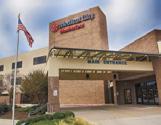

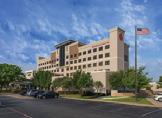



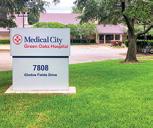

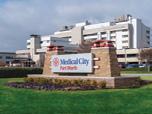





MethodistHealthSystem.org.
Multi-Chapter Education Event




A Publication of the American College of Healthcare Executives of North Texas Chapter | FALL 2022
June 24, 2022 EVENT ENCORE






After Hours Networking Event: Texas Rangers v. Oakland Athletics

July 7, 2022 EVENT ENCORE





Community Event - Faith in Action




A Publication of the American College of Healthcare Executives of North Texas Chapter | FALL 2022
July 28, 2022 EVENT ENCORE





Mentorship Program Mid-Year




A Publication of the American College of Healthcare Executives of North Texas Chapter | FALL 2022
Networking Event August 4th, 2022 EVENT ENCORE




After Hours Event: Axe Throwing August 11th, 2022 EVENT ENCORE
EVENT
Third Quarter Education Event: Exploring Professional Well-Being and Retention August 11, 2022
by Audrianne Schneider, FACHE
Texas Health Fort Worth hosted the third quarter education event on August 25th, featuring two panels that focused on the importance of professional well-being and the importance of nurse recruitment and retention efforts.
During the first panel, experts discussed sustainable strategies to support resiliency and professional well-being for health care professionals – and leadership’s role to model the behavior. Some key themes included connecting work to mission, recognition, early detection of issues, addressing incivility, creating support systems, asking hard questions, and listening to responses. During the self-care discussion, Dr. Thomas Glenn Ledbetter stated, “We must see healthcare through the lens of well-being and know when to push away from work.”
After dinner and networking, experts for the retention panel discussed ways to recruit and retain registered nurses. Shonna Bracco, DNP, stated “Anything monetary is temporary.” Leaders must create and implement unique incentives to recruit and retain top talent, including:
• Be mindful of how to engage this audience with their preferences (five generations of nurses in today’s workforce).
• Consistent leader rounding – listen and take action (when needed).
• Encourage the use of paid time off and the importance of family time.
• Create a safe environment – safe for employees to speak up and safe from workplace violence.
Panelists discussed the importance of “growing our own’’ through patient care technician, certified nursing assistant, medical assistant, and other tracks to becoming a registered nurse. They emphasized that pipeline programs are key, as well as partnering with schools.
Ajith Pai, president of Texas Health Harris Methodist Hospital Southwest Fort Worth, closed the session by thanking the panelists and announcing a donation in honor of their service to the ACHE North Texas Leadership Legacy Fund.
Panel 1: Sustainable Strategies to Support Resiliency and Professional Well-being for Healthcare Professionals
Christi Nguyen, DNP, RN, FACHE, NEA-BC; ACNO of Nurse Excellence; UT Southwestern Medical Center (Moderator)
Elaine Beardsley, MN ACCNS-P CPEN; Clinical Resiliency Specialist Program Manager; Children’s Health
Dr. Thomas Glenn Ledbetter; Chief Medical Officer; Baylor Scott & White Health DFW Central Region and BSWH Waxahachie
Glenda Mutinda, PhD, MFT; Director of Interprofessional WellBeing; JPS Health Network
Mihir Patel, MD, MBA, FACP, CPE; Chief Medical Officer, Monarch Region; Sound Physicians
Panel 2: RN & Clinical Staff Retention & Turnover
Traci Lawler-Shortt, DNP; Client Services Vice President/ Clinical Operations Specialist/Lead Nurse Practitioner; SCP Health (Moderator)
Katie Bata Heeter, Senior VP; HR Strategic Business Services; Baylor Scott & White Health
Shonna Bracco, DNP, Chief Nursing Officer, Texas Health Resources
Kelly Martin, Vice President of Human Resources; Texas Health Resources
30 A Publication of the American College of Healthcare Executives of North Texas Chapter | FALL 2022
ENCORE




Breakfast with the Vice President September 15, 2022
by Michael Belkin, FACHE
On Thursday, September 15th, about 50 members and guests of the North Texas Chapter of the American College of Healthcare Executives met at Methodist Charlton Medical Center to spend time together, network and hear from Patrick Brown, FACHE who serves as Vice President and Chief Operating Officer at the Charlton campus. The excitement of members and guests was evident as everyone enjoyed being together and hearing from a great speaker.
Patrick shared his personal journey and spoke about Methodist in general and specifically about the new developments at the Charlton campus. Patrick is the son of an Army Veteran, and we thank his family for their service. Growing up in a military family provided Patrick an opportunity to live on various army bases and learn an incredible foundation of discipline and service. After excelling as a college football player, Patrick found himself moving up the executive ladder with the UPS corporation. As Patrick was moving ahead within UPS, he had a calling to make a significant contribution to society. Fate would open the door for Patrick as his mother encountered a timely opportunity for him to join the human resources department within a hospital. This opening led Patrick to a life and career within the healthcare delivery system.
Patrick shared his journey from human resources to supply chain to business development and finally to his current role in hospital operations. The audience was engaged and inspired by quotes from Patrick’s mentors, the Bible and finally his own words of wisdom. It was clear that Patrick has been blessed with great mentors during his career and he shared that he is giving back to the younger generation of leaders by currently mentoring others.
Patrick shared his conviction to work through challenges
because “choppy seas make the best sailors.” It was a very timely message given the past several years of pandemic, constant change, and disruption. He also discussed how he has learned to value the trust an administrator must build with the physician staff. To provide quick feedback to physicians is a great lesson for all executive healthcare leaders.
It was clear that Patrick views his role within healthcare delivery as a mission and a ministry.
Lastly, it was exciting to learn about the $71 million expansion and relocation of the Methodist Charlton Emergency Department. Charlton is the busiest Emergency Department within the Methodist system averaging 80,000 visits per year to the Level III trauma center. The hospital serves nearly 500,000 people and a 70% minority patient population. The emergency department will be relocated to an easier access location and the number of beds will increase from 45 to 70. This change will be an incredible asset to the population served by the medical center.
The audience left excited to be together, thankful to have learned about Patrick and confident that the Texans served by Methodist Charlton are in the best of hands.
We would like to thank Methodist Charlton for hosting the event and providing breakfast to the attendees. We would also like to thank Patrick Clarke for the additional photos.
32 A Publication of the American College of Healthcare Executives of North Texas Chapter | FALL 2022
EVENT ENCORE






A Publication of the American College of Healthcare Executives of North Texas Chapter | FALL 2022
Virtual Event: What to Do When the Government Comes Calling May 10, 2022
by Amanda Brummitt, FACHE
Do you know what to do if the government shows up at your facility? Anthony “Tony” Box and Jenny Givens, Partners at Gray Reed educated ACHE North Texas members on what to do and perhaps more importantly, what not to do. They shared a lot, but here’s a quick recap as a general overview and not to be taken as specific legal advice. First and foremost, call your legal counsel immediately if you are presented with a warrant, subpoena, or civil investigative demand.
Warrants
Tony, also a former FBI agent, walked us through what a search warrant covers, to ask for identification if the agents don’t present it, whether to provide consent, and how onsite interviews work.
Spoiler alert: You aren’t required to give consent or submit to the on-site interviews. Call your attorney for advice!
Jenny offered advice on how to handle staff, customers, inventorying your property, and communications with the press. Examples include, staff has the right to remain silent and have counsel present. Staff also have the right to talk to agents if they desire and the employer can’t prevent them. Staff should also know that lying to federal agents is a felony. On the public relations (PR) front, make decisions with your legal counsel and PR firm on how you will communicate with the public and your customers.
Do not obstruct the facilitation of the search warrant. Don’t destroy, alter, remove, or hide documents. Do not turn over matters that may be attorney-client protected or sensitive company information. And, do not throw your hot coffee on the agents (from a real life example).
Subpoenas & Civil Investigative Demands
They explained that a subpoena can be issued for documents or testimony. They tend to ask in a very specific format produced in a very specific way, such as searchable PDFs with metadata.
A civil investigative demand is like a subpoena and used for civil cases, such as the False Claims Act. They may request that you produce written answers to questions, so work with your legal counsel to ensure compliance.
They also pointed out that all communications will be recovered and play a significant role in investigations. Consider how a text or email may look to an outsider before sending it, both on personal and company devices.
Before the Government Comes Calling
They encouraged building a good offense long before you need to defend your organization. Work with a healthcare attorney to have a strong compliance plan in place to minimize risk. Jenny recommended this Office of Inspector General resource: https://oig.hhs.gov/compliance/compliance-guidance
Have great policies and actually follow them throughout the organization.
Have an established relationship with a public relations firm and white-collar defense attorney. Have a plan for what to do if the government does come calling. It will be an extremely stressful event either way, but a plan can ease the process.
34 A Publication of the American College of Healthcare Executives of North Texas Chapter | FALL 2022 EVENT ENCORE
“The best defense is a good defense. Work with a healthcare attorney to have a compliance plan in place to minimize risk.”
Let’s get social



National News
Advancing Diverse Executives

Meet the 37 scholars selected for ACHE’s 2022 Thomas C. Dolan Executive Diversity Program and Career Accelerator Program , who come from a variety of backgrounds and disciplines.
This year, the Executive Diversity Program will consist of e-learning, including webinars; self-study materials; and three multiday, in-person sessions. The Career Accelerator Program is exclusively virtual. Dolan scholars are empowered through a structured curriculum and activities that cultivate strong leadership presence; sharpen expertise in diversity, equity and inclusion; build critical leadership skills; and expand one’s capacity to navigate career opportunities and challenges. Both programs are six months in duration and are wholly funded by the Fund for Healthcare Leadership.
For more information, visit ache.org/DiversityandInclusion to learn more about the Executive Diversity Program, Career Accelerator Program, and other diversity and inclusion resources.
ACHE Blog and Podcast
Gain best practices and learn from your peers through our blog and the Healthcare Executive Podcast . Both the blog and podcast provide up-to-date content on the issues most pressing to healthcare executives. Be sure to share these with your colleagues. Follow the Healthcare Executive Podcast wherever you access podcasts.
ACHE Job Center
Did you know the ACHE Job Center is one of the most frequently visited and valued features on ache.org? With more than 3,000 jobs posted, the Job Center features:
• A contemporary, updated design improving user experience and interface utilizing a modern look and feel for all pages within the Career Resource Center.
• Intuitive job search functionality allowing users to search for, view and apply to jobs on the same page.
• Customized job alerts designed to strategically define and coordinate push notifications based upon job titles, geography, organization name, salary range and more.
• Job seeker profile creation available to all members interested in setting up a job seeker account and resume access to ACHE-approved employers for enhanced visibility.
• Online recruitment and job posting for members looking to promote available positions, recruit high-caliber candidates and leverage the expertise of ACHE member candidates.
Need to come up for air?
We make running a hospital easier. soundphysicians.com/whale We get it.
Patient Physician Network






@patient-physician-network @PPNHCo WWW.PPNHCO.COM For more information, please visit our website, or contact our Advisory Services Team directly at AdvisoryServices@drppg.com
The Leader in Advancing Independent Medicine
WELCOME ACHENTX’S NEWEST MEMBERS
JUNE AUGUSTJULY
Jaylia Bitner, LMFT, MS
Abby Blakely, LCSW
LaTosha Boldware
Michael D. Duncan, MD, FACP
Meredith E. Jaiyesimi Catherine Lux, DNP, MBA
Tiffany C. Mitchell Lisa Nielson Chris Paliotta
Ami M. Patel Niyati Patel, BDS, MHA Tysha Powell, AuD Jeremy Taylor Kimberly Valenta, MD Clayton Westmoreland Patrick Woods
Wilma Ayala
Kari Couret
Angela Cox, MHA, MSN, RN
Charity Darnell, BSN
MARGARETTE S. DONNAY
Amris R. Hase
Nada Hashim
HM1 MICHEAL O. IHENETU, BSc
Jocelyn Kopchak
Terrance K. Nicholas, EdD, MBA Erik J. Ortega Diane Partin Elizabeth Pulliam
Landra Sheffield
Charles M. Slaton Layton Sumpter
Stanley Whittenberg Brooks Williams
Bradley L. Adams, JD Edwin Aghedo Brittany Brooks, MD
Raina Brooks
Scott Contino
Garrett A. Dewbre
Jennifer L. Flores Preston J. Frayser
Miriam Hernández
Ken C. Hopper, MD, MBA
Michael G. Johnson, MD, MBA Amanda R. Novak
Aleah Pace Justin Raschke
Eric Schinske, MSW
Eduardo Q. Sibala Paige Smith Merveille Sul
Brandon Sullivan
Nita N. Tachie, MSHA
Robyn D. Taylor, MBA
Joby Varughese, PharmD Mary Vitullo, RN, MSN, MBA
RECERTIFIED FELLOWS
JUNE AUGUSTJULY
Andie G. Gardner, FACHE
Steven A. Edgar, FACHE
Kim M. Kimberling, RN, FACHE Blake W. Kretz, MHA, FACHE
J. Michael DeLeon, FACHE David E. Domingue, FACHE
John D. Mitchell, FACHE
Pam Yoo, FACHE
David
AUGUST
Jeffrey
ACHENTX’S NEWEST FELLOWS JUNE Alexandra N. Breckenridge, FACHE Donald W. McLaughlin, FACHE Seetha Modi, FACHE Derrick Villa, FACHE JULY
P. Leachman, MD, MBA, CPE, FACHE Herron Mitchell, MBA, FACHE Paula B. Reisdorfer, FACHE
C. Brooks, FACHE Jaime L. Ricketts, FACHE Check Out ACHENTX’s Upcoming Events SEE EVENTS
All these listed events are scheduled to be held virtually. Please keep monitoring our Weekly Announcements for other virtual and in-person events in the works.
October 20, 2022 Asian Healthcare Leaders Community Event: Breaking the Bamboo Ceiling
October 27, 2022 “Fourth Quarter Education Event: Panel 1: Fostering Inclusion of Patients and Employees with Disabilities (Partnering with D&I) Panel 2: Behavioral Healthcare: Approaches to Increase Value for the Organization and Meet Community Needs”
November 10, 2022 General Membership Convocation: Organizational Silence and Hidden Threats to Patient Safety
November 15, 2022 Networking Blitz
November 17, 2022 “Multi-Chapter Event - Panels 1 & 2 Panel 1) Equity of Care Panel 2) Population Health”
December 6, 2022 Breakfast with the President - Benson Chacko (40 max)
December 8, 2022 “Multi-Chapter Event - Panels 3 & 4 Panel 3) Culture of Safety Panel 4) Sustainability of Healthcare” Breakfast with the President - Benson Chacko (40 max)
Methodist Southlake Medical Center
Methodist Dallas Medical Center
Click here to learn more or register for an event
Brookhaven Country Club, Farmers Branch
Texas Health HEB
Virtual
Methodist Southlake Medical Center
Virtual
We Appreciate the Support of Our ACHENTX Gold Sponsors

A Publication of the American College of Healthcare Executives of North Texas Chapter | FALL 2022 41























































































































